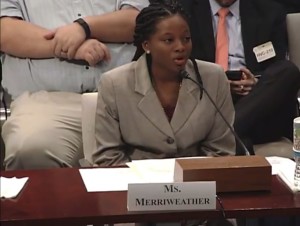
Denisha Merriweather has told the story of school choice changing the trajectory of her life countless times. On Wednesday, for the first time, she brought that story to Congress.
She told the House Education and Workforce Committee that she moved from school to school constantly as a child, struggled to read and master multiplication, was picked on and got into fights, and seemed on a path to follow the path of her biological mother and other relatives who dropped out of school. That all changed when she moved in with her godmother, who found her a private school that would push her to become the first in her family to graduate from college — and a scholarship that placed the Esprit de Corps Center for Learning in Jacksonville, Fla. within reach.
“The cycle of poverty is ending in my family because of the Florida tax credit scholarship,” she said. “I received a quality education, and because of my example, my siblings are now seeing how to take advantage of educational opportunities that come their way.”
School choice (particularly charter schools) got a boost in the sweeping rewrite of federal education law approved late last year, and could be on Congress’ radar again this year, as the D.C. Opportunity Scholarship Program comes up for renewal.
Merriweather showed that while academic achievement matters, students seek school choice for other reasons. A sense of stability, safety from bullies, and smaller classes where teachers had extra time to help with times tables mattered, too.
Her comments provided a foil to the choice skeptic on the panel. Luis Huerta, an assistant professor at Columbia Teachers College, poked holes in studies showing voucher programs improved student achievement, and questioned whether that research should be extrapolated to inform policy debates. The “evidence is mixed,” he said, when it comes to choice improving educational quality, and school vouchers often aren’t generous enough to cover the costs of educating low-income students and building new schools to house them. “We’re talking in the range of $14,000 to $15,000 in quality private schools,” he said.
Merriweather, who is now pursuing a master’s degree in social work at the University of South Florida, said, “I’ve seen the power of tailored education demonstrated in my own life, and I would like to see it expanded in future generations and this one. It has proven to be effective in my life.” But, she added later in response to questions, that doesn’t mean school choice programs shouldn’t be accountable for their results.
Step Up For Students, which publishes this blog, helps administer Florida’s tax credit scholarship program.


